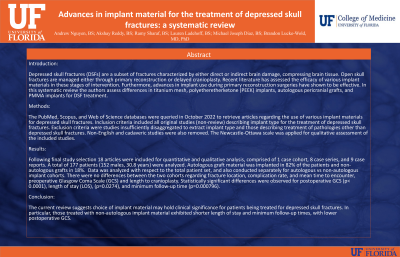Advances in Implant Material for the Treatment of Depressed Skull Fractures: a Systematic Review
Advances in Implant Material for the Treatment of Depressed Skull Fractures: A Systematic Review
Friday, April 21, 2023

.jpg)
Andrew Nguyen, BS
Medical Student
University of Florida, College of Medicine
ePoster Presenter(s)
Introduction: Depressed skull fractures (DSFs) are a subset of fractures compressing brain tissue. Open skull fractures are managed through primary reconstruction or delayed cranioplasty. Recent literature has assessed the efficacy of various implant materials in these stages of intervention. Furthermore, advances in implant use during primary reconstruction surgeries have shown to be effective. In this systematic review the authors assess differences in titanium mesh, polyetheretherketone (PEEK) implants, autologous pericranial grafts, and PMMA implants for DSF treatment.
Methods: PubMed, Scopus, Web of Science were queried in October 2022 to retrieve articles regarding the use of various implant materials for depressed skull fractures. Inclusion criteria included original studies (non-review) describing implant type for the treatment of depressed skull fractures. Exclusion criteria were studies insufficiently disaggregated to extract implant type and those describing treatment of pathologies other than DSFs. Non-English and cadaveric studies were removed. The Newcastle-Ottawa scale was applied for qualitative assessment.
Results: Eighteen articles were included for quantitative and qualitative analysis, comprised of 1 case cohort, 8 case series, and 9 case reports. A total of 177 patients (152 males, 30.8 years) were analyzed. Autologous graft material was implanted in 82% of the patients and non-autologous grafts in 18%. Data was analyzed with respect to all patients, and also separately for autologous vs non-autologous implant cohorts. There were no differences between the two cohorts regarding fracture location, complication rate, and mean time to encounter, preoperative Glasgow Coma Scale (GCS) and length to cranioplasty. Statistically significant differences were observed for postoperative GCS (p < 0.0001), length of stay (LOS), (p=0.0274), and minimum follow-up time (p=0.000796).
Conclusion : The current review suggests choice of implant material may hold clinical significance for patients being treated for depressed skull fractures. In particular, those treated with non-autologous implant material exhibited shorter length of stay and minimum follow-up times, with lower postoperative GCS.
Methods: PubMed, Scopus, Web of Science were queried in October 2022 to retrieve articles regarding the use of various implant materials for depressed skull fractures. Inclusion criteria included original studies (non-review) describing implant type for the treatment of depressed skull fractures. Exclusion criteria were studies insufficiently disaggregated to extract implant type and those describing treatment of pathologies other than DSFs. Non-English and cadaveric studies were removed. The Newcastle-Ottawa scale was applied for qualitative assessment.
Results: Eighteen articles were included for quantitative and qualitative analysis, comprised of 1 case cohort, 8 case series, and 9 case reports. A total of 177 patients (152 males, 30.8 years) were analyzed. Autologous graft material was implanted in 82% of the patients and non-autologous grafts in 18%. Data was analyzed with respect to all patients, and also separately for autologous vs non-autologous implant cohorts. There were no differences between the two cohorts regarding fracture location, complication rate, and mean time to encounter, preoperative Glasgow Coma Scale (GCS) and length to cranioplasty. Statistically significant differences were observed for postoperative GCS (p < 0.0001), length of stay (LOS), (p=0.0274), and minimum follow-up time (p=0.000796).
Conclusion : The current review suggests choice of implant material may hold clinical significance for patients being treated for depressed skull fractures. In particular, those treated with non-autologous implant material exhibited shorter length of stay and minimum follow-up times, with lower postoperative GCS.
